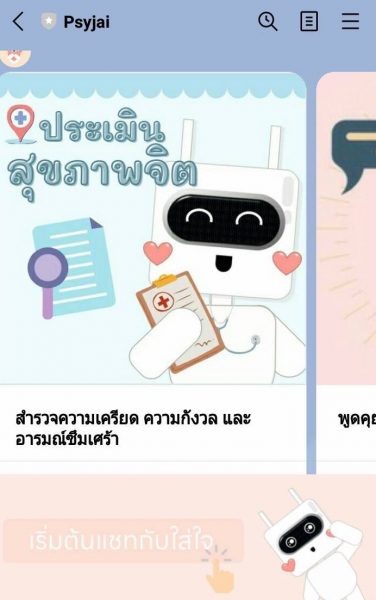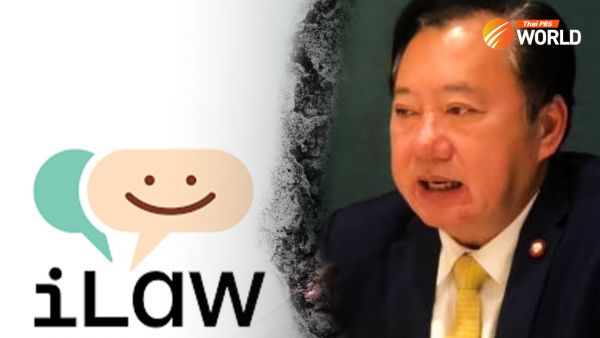How smart technology helps in healthcare

Science and technology make life easier, safer and more comfortable for us all. In the medical and healthcare fields, advances in science and medical technology have generated vaccines to tackle some of the world’s most devasting diseases including Covid-19, improved the accuracy of diagnosis, made treatment more effective and upped the overall quality of patient care.
Smart technologies, in particular, can help enhance the quality of people’s lives so that they become less reliant on human staff while simultaneously promoting independence. The AI-driven chatbot ‘Psyjai’ and assistive robot ‘Dinsaw Mini’ are just two of the examples of how AI, machine learning, the Internet and smartphones help people maintain their health, improve the quality of patient care, and create a healthier world.
Psyjai – a new and innovative way of boosting mental health and wellbeing
Created by Mahidol University’s Thailand Mental Health Technology and Innovation Center, Psyjai (pronounced as ‘sai jai’) is a mental health chatbot service through the Line app that helps people manage their mental health in order to make them feel their best. The bot is powered by AI, a technology that mimics human intelligence to perform tasks, allowing it to act as a therapist to help support mental health and well-being.
‘Psyjai is not created to replace a live therapist. The bot is a tool to help screen for or support people with emotional and mental distress. It helps you identify what is troubling you and then provides the tools and support you need to improve your mental health,” said Napawan Munpansa, a psychology researcher at the Thailand Mental Health Technology and Innovation Center.
But, Psyjai is not for everyone. Nor is it for emergencies and those undergoing a mental health crisis, she noted.
“If you’re through a serious depressive episode, you should see a mental health professional. Psyja is not the thing for you. Remember that it’s a bot so it cannot give you the immediate help you need,” she said.
Psyjai was created in 2020 to help people cope with the mental health consequences of the Covid-19 pandemic in response to the high number of people reporting psychological distress and symptoms of depression and anxiety, and to the demand for mental health services which had surpassed availability.

Mental health conditions are a growing global public health concern. The World Health Organization recorded 1 in 8 people or 970 million people around the world living with mental disorders in 2019. The number of people living with anxiety and depressive disorders rose significantly during the Covid-19 pandemic.
Psyjai project is a joint effort between the Faculty of Medical Siriraj Hospital’s Department of Psychiatry and the Faculty of Engineering’s Computer Engineering Department, Mahidol University. It’s funded by the Broadcasting and Telecommunications Research and Development Fund for Public Interest.
Simple and user-friendly
Psyjai is very user-friendly and begins by “saying hello” to the user and introducing herself, is. To interact with her, the user answers the multi-choice questions provided. It allows them to share their problems in their own words by typing questions and answers into a text box just like they would in any messaging app and Psyjai responds.
Napawan explained that when users type the answers, AI analyzes the words and phrases in them to give uplifting messages or advice to boost their mental health from a database of responses pre-written by a team of psychologists.
“Psyjai is reliable. The bot has psychologists backing up the advice it gives,” she said.
This text-based mental health service has four areas for the user to work on: mental health test; dealing with feelings; chatting with Psyjai, and everyday mental health tips.
The mental health test is used to assess whether users may have been affected by stress, depression and anxiety over the past few weeks. After completing the test, the bot will tell them where they fall in relation to how they are feeling and give support services that may help them.
The bot also connects you with mental health resources like a hotline and support group when users’ response indicates a serious problem.
“Psyjai is an online tool that can help you track your moods, understand them and teach you how to manage your emotions better,” Napawan said.

The bot is available on demand, meaning that you can use the service anywhere and at any time.
More than 5,000 people used the service between 2021 and 2022.
The service is free. Anyone wishing to use it can go to Line ID @psyjaibot.
Dinsaw Mini – an assistive robot that helps promote health for the elderly
Developed by a Thai company, Dinsaw Mini is a nursing and assistive robot that helps health providers and caregivers improve the quality of care for older adults. The project is in response to an increase in the elderly population.
With the help of AI and human detection sensors, the mini robot can monitor the elderly and patient movements and help them to be punctual in taking their medication. It can also alert nurses or caregivers in emergency situations. When patients are in immediate need of help, messages are sent to nurses or caregivers via smartphone.
Dinsaw Mini has been used to help nurses and caregivers in many leading hospitals and nursing homes in Thailand.
Psyjai and Dinsaw Mini were among the showcased items at the National Science and Technology Fair 2023 held at the Bangkok Art & Art Culture Center in Bangkok’s Pathumwan district last week.
By Thai PBS World Feature Desk






